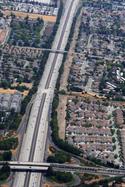The latest house price data indicates no respite in the continuing price declines, especially where the declines have been the most severe. But no place has seen the devastation that has occurred in California. As median house prices climbed to an unheard-of level – 10 or more times median household incomes – a sense of euphoria developed among many purchasers, analysts and business reporters who deluded themselves into believing that metaphysics or some such cause would propel prices into a more remote orbit. read more »
Suburbs
Report: Ontario, CA – A Geography for Unsettling Times
These are unsettling times for almost all geographies. As the global recession deepens, there are signs of economic contraction that extend from the great financial centers of New York and London to the emerging market capitals of China, India and the Middle East. Within the United States as well, pain has been spreading from exurbs and suburbs to the heart of major cities, some of which just months ago saw themselves as immune to the economic contagion.
Without question, the damage to the economies of suburban regions such as the Inland Empire has been severe. read more »
Oregon’s Immigration Question: Addressing the Surge in the Face of Recession
The men huddle outside the trailer, eyeing the passing traffic. Handmade signs stapled to telephone posts speak for them: “Hire a Day Worker!” The site, a fenced-in lot at Northeast MLK and Everett Street, was launched in 2007, a testament both to Oregon’s recent immigration boom and lack of federal reform. read more »
- Login to post comments
Memorialist of Suburbia
John Updike, the bard of the suburbs, died this week. He was one of the first great American writers to revel in the opportunity, beauty and convenience that the suburbs have long reflected. His voice, first found in the sixties, acted as a reasonable anchor in the tempest of radicalism that swept through the country. He empathized with the American dream rising in the raw suburbs being carved from agricultural land. read more »
The Future of the Shopping Mall
By Richard Reep
“I had two rules for Christmas this year:
1. Under 13 years old only;
and
2. Internet only.”
–overheard at Stardust Video and Coffee in Orlando, Florida.
One of the most distinctive benchmarks of contemporary American life, the classic indoor shopping mall, is now gasping for survival. The two rules expressed above were commonly heard during this shopping season, calling into question whether the 20th century indoor shopping mall will survive in its present form. read more »
The Importance of Productivity in National Transportation Policy
For years, transit funding advocates have claimed that national policy favors highways over transit. Consistent with that view, Congressman James Oberstar, chairman of the powerful House Transportation and Infrastructure Committee, wants to change the funding mix. He is looking for 40 percent of the transportation funding from the proposed stimulus package to be spent on transit, which is a substantial increase from present levels.
This raises two important questions: The first question is that of “equity” – “what would be the appropriate level to spend on transit?” The second question relates to “productivity” – “what would be the effect of spending more on transit?” read more »
Rust Belt Realities: Pittsburgh Needs New Leaders, New Ideas and New Citizens
The current recession provides a new opportunity for Pittsburgh's elite to feel good about itself. With other boom economies from Phoenix to Miami on the skids – and other old Rust Belt cities like Detroit, Cleveland and Buffalo even more down on their luck – the slow-growth achievements of the Pittsburgh region may seem rather impressive.
Yet at the same time, the downturn also poses longer-term challenges for which the local leadership is likely to have no answers. read more »
Farmer’s Markets: Reviving Public Space in Central Florida
By Richard Reep
Noted architect Daniel Liebeskind, teaching at Yale in the early 1990s, proclaimed “Public space is dead”. A provocative notion at the time, he was simply observing American cultural phenomena, and our evolution away from Main Street into the mall, away from the downtown church to the suburban megachurch, and away from common space into private space. While all this is true, it misses a countercyclical element in our cities, and in the Orlando area, public space is very much alive and assuming a new role in the neighborhoods. read more »
China Should Send Western Planners Home
For centuries, the West sent missionaries around the world to spread various gospels. It is no different now, though the clerics tend to hold degrees from planning schools rather than those overtly specializing in theology.
This could also create tragic results as ideologies created in one context are imported into a totally foreign one. read more »
Will The New Air Pollution Science Choke City Planners?
Part One of A Two-Part Series
Not long ago, Michael Woo, a former Los Angeles city councilman and current member of the Los Angeles City Planning Commission, took up a case pending approval by that body: a mixed housing-retail development near the intersection of Cahuenga Boulevard and Riverside Drive. Like many of the remaining buildable sites in the city, the property is right next to a roaring motorway; the windows of some apartments would look right out onto the 134 Freeway. To Angelinos, who have grown up in a car culture, it was hardly a remarkable proposal. But Woo, perhaps one of the brainier members of the city’s political elite—after losing a mayoral race to Richard Riordan in the early 1990s he became a professor of public policy at University of Southern California—had a problem with it, and he couldn’t quite let it go. read more »






















